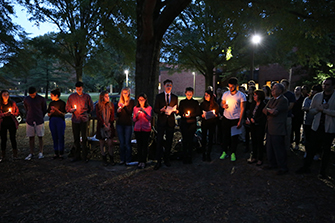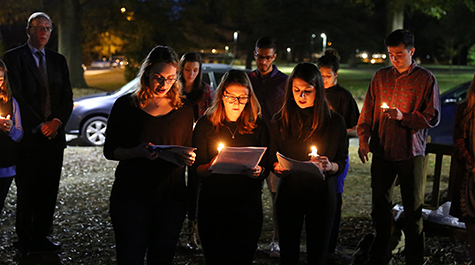Law Students Host Vigil for Those Slain in Pittsburgh and Kentucky
On Thursday evening, Nov. 2, about 200 students, faculty and staff gathered in a circle on the front lawn of William & Mary Law School to light candles in memory of the 13 people slain in Pittsburgh and in Jeffersontown, Kentucky, and to express hope in the power of unity to combat hate. Eleven of the 13 died in a synagogue in what was the deadliest attack against Jews in U.S. history; days earlier, two black patrons were killed in a grocery store by a white gunman who moments before had tried unsuccessfully to enter a predominantly black church.
“It means so much to have such an inclusive group standing in solidarity for the victims of this past weekend’s hate crimes, and we hope this evening will bring some comfort and healing,” said Mikaela Phillips J.D. ’21, who organized the event with classmates Jamie Eisner J.D. ’21 and Leah Kesselman J.D. ’21. The event was co-sponsored by the Jewish Law Students Association, the Black Law Students Association, the Muslim Law Students Association, the Latino Law Student Association, the Christian Legal Society, the Equality Alliance, and the Student Bar Association.
Dean Davison M. Douglas said that in the days following the shootings he was reminded how acts of such hatred and violence leave many stunned and searching for a sense of community to help to begin to assuage their shock and pain. “I have no profound words to offer other than we remember those who died, and we pledge ourselves to move forward into this world in a way in which we can be instruments of peace and instruments of justice,” he said.
 A string of lights slowly formed in the twilight as students lit the first candle in memory of all victims of hate crimes, then, one by one, lit a candle for each of 13 victims. Students led the group in observing a moment of silence and reciting the Mourner’s Kaddish in memory of those killed. Through poems and personal statements, they spoke about loss and prejudice and violence, and the importance of unity in the face of hate.
A string of lights slowly formed in the twilight as students lit the first candle in memory of all victims of hate crimes, then, one by one, lit a candle for each of 13 victims. Students led the group in observing a moment of silence and reciting the Mourner’s Kaddish in memory of those killed. Through poems and personal statements, they spoke about loss and prejudice and violence, and the importance of unity in the face of hate.
For some speakers, the attack on the synagogue made them fearful for their safety and for that of the Jewish community. Others spoke about relatives who had survived pogroms and concentration camps to seek a new life in America.
Leah Kesselman J.D. ’21 shared the story of her late grandparents, who were refugees who had survived Auschwitz. They dedicated the rest of their lives to sharing their story as eyewitnesses to the Holocaust, she said, because “they knew they couldn’t let the world forget.”
“The message I want to share with you is this,” Kesselman said. “Do not let the world forget because when we forget our mistakes, we repeat them. Speak up when you believe something is wrong. Defend those in need, and don’t let the world forget how dangerous hate can be.”
Brogan Chubb J.D. ’20 said his grandmother urged him “to be on his best behavior at all times” in the hope it would protect him as he ventured into a world where African-Americans were not treated as equals. It was an exercise in futility, he said, for “no matter how good our behavior may be, no matter how much we try to avoid racism and discrimination, it always finds us.”
“Hate has no place in our community and coming together to support each other is vital in times like this,” he said. “Unifying as a community can help push us towards the sense of safety and belonging we all long for.”
Michael Heard Snow J.D. ’21 was among the last speakers and he reminded the audience that the recent hate crimes happened only days apart from the interment in Washington National Cathedral of Matthew Shepard, a young gay man brutally murdered 20 years ago.
“Mindless hatred never only affects the community to whom it is directed, it affects all of us, it harms the society where those communities reside, and that hurt ripples out,” he said.
Against a tide of scapegoating and vitriolic rhetoric, he said, “it is more important than ever for all such communities to stand together as allies against hate, and to give each other the space to heal.”
